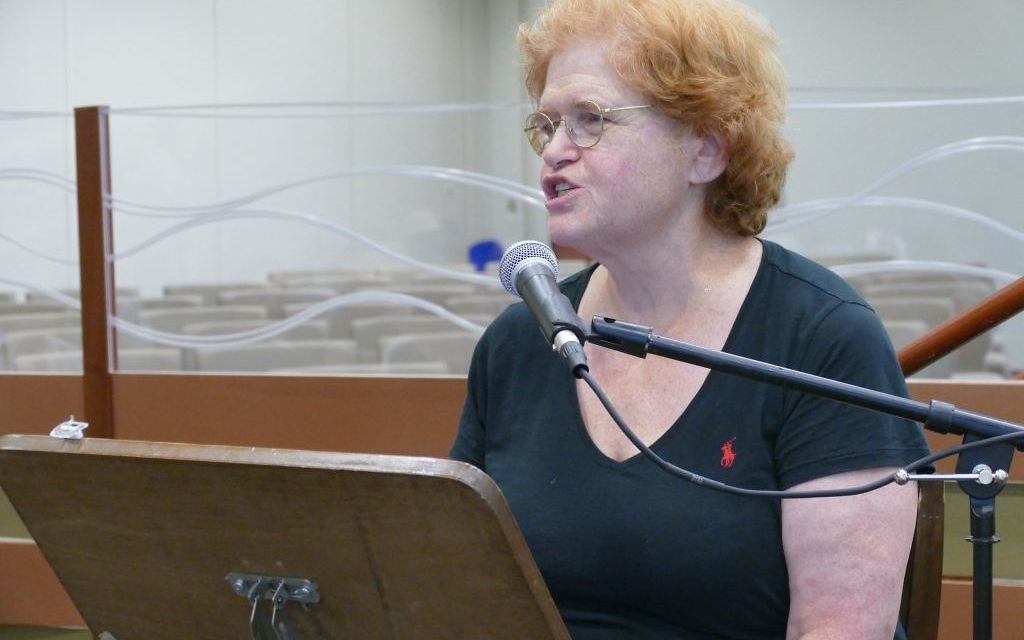Jew-Hatred by Any Name Just as Foul
Dr. Deborah Lipstadt provides an update on contemporary anti-Semitism at YITH annual Tisha B'av lecture.

The most common spelling of “anti-Semitism,” with the lowercase a, the capital S and the hyphen, is wrong, Deborah Lipstadt says.
According to the Dorot professor of modern Jewish history and Holocaust studies at Emory University, that spelling (used by the AJT) fails to capture the philosophical meaning of the word.
“The prefix ‘anti’ is mostly used with common words which can stand alone, such as anti-immigration or anti-taxes; however, there is no such thing as Semitism, but rather Semitic languages,” Lipstadt said Tuesday, Aug. 1, during her annual Tisha B’Av lecture at Young Israel of Toco Hills, titled “Contemporary Antisemitism: An Update.”
Get The AJT Newsletter by email and never miss our top stories Free Sign Up
Although anti-Semitism has multiple definitions, Lipstadt pointed to a description introduced by British philosopher Isaiah Berlin, who is credited with saying an anti-Semite is someone who hates Jews more than necessary.
“If you think about it, this is a great definition because the connotation matters. If someone asks you to describe an individual at a crime scene, and you respond, ‘It was a tall gentleman who was black’ vs. ‘It was a black man,’ it possesses a different meaning,” Lipstadt said.
Lipstadt also addressed philo-Semitism, in which a positive remark about Jews might still reflect anti-Semitism. “An individual who is in trouble with the law will often say, ‘I am going to hire a smart Jewish lawyer,’ and if the person is found guilty, they are likely to state, ‘My Jewish lawyer failed.’ However, it is important to note that being Jewish is irrelevant,” she said. “An individual can hate someone, but if it’s one iota more because they’re Jewish, it’s considered anti-Semitism.”
Anti-Semitism, Lipstadt said, represents a persistent structure of hostile beliefs about Jews as a collective, involving nefariousness, power and intellect to get others to do things that might not be in their best interest.
“If you feel like something is anti-Semitic, look for an element which states, ‘Those Jews manage to …’ ” Lipstadt said.
She presented different types of anti-Semites: the extremist, whom everyone recognizes as universally opposed to Jews; the savvy or polite, who often claims that “some of my best friends are Jews”; the blatant, who talks about “you Jews”; and the accidental, who genuinely does not know he is making anti-Semitic remarks.
“It’s irrelevant if someone is on the right or left in terms of the political spectrum. Anti-Semitism is an issue that manifests across the board,” Lipstadt said. “We can find it on both sides, whether you look at it in this country at the alt-right or other countries such as Hungary, you can see it in multiple forms. However, we can’t continue to use the fight against anti-Semitism to achieve our own political goals.”
The term “intersectionality” is commonly used to link two separate issues, such as the shooting of Michael Brown in Ferguson, Mo., and the situation of the Palestinians, she said. “You often hear this from many students who feel they are being forced to choose between their ideologies, and (it) has become endemic on college campuses.”
The denial of Israel also has spread among campuses, Lipstadt said. “It is one thing to have not believed in the existence of Israel in 1940. However, now that you have a living, breathing state with 7 million people in it while you’re citing its destruction, I would argue that that’s anti-Semitism.”
But she said there are nuances when referring to anti-Semitism, including the boycott, divestment and sanctions movement.
“I think we have to use a scalpel as opposed to an ax. I agree that at its heart the founders of the BDS are anti-Semitic; however, I also know students who are not anti-Semitic but may naively feel that the BDS movement is a way to get Israel to change its policy and is antithetical to others’ plight,” Lipstadt said.
She said Israel is a toxic issue on college campuses. “Individuals are either ardently supporting every act of Israel’s policy or opposed; however, there is little to no room for individuals who seek to learn or know more.”
Lipstadt said the Jewish community must be careful when condemning people. “We can disagree without categorizing people. We can disagree profoundly, but we can also disagree without condemning.”




comments